Religion in Lebanon
Lebanon is an eastern Mediterranean country that is composed of mostly Muslims and Christians.[2] The main two religions are Islam with 61.1% of the citizens (Sunni and Shia) and Christianity with 33.7% of the citizens (the Maronite Church, the Orthodox Church, the Melkite Greek Catholic Church, Protestantism, the Armenian Apostolic Church). The Druze are about 5% of the citizens.[2] The country has the most religiously diverse society of all states within the Middle East, comprising 18 recognized religious sects.[3][4] But outside of Lebanon, Lebanese people (including diaspora) are mostly Christians.[5][6] It is also estimated that a large proportion of its population are refugees (1.5 million out of a bit over 6 million in 2017) which affects statistics.[3] The refugees mostly Syrian or Palestinian are predominately Sunni but also includes Christians and Shia.[3]
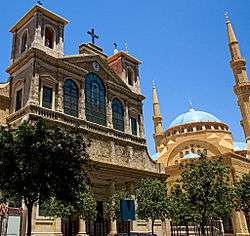
Lebanon thus differs from other Middle East countries where Muslims are the overwhelming majority and more resembles Bosnia-Herzegovina and Albania, both in Southeastern Europe, in having a diverse mix of Muslims and Christians that each make up approximately half the country's population. Christians were once a majority inside Lebanon and are still a majority in the diaspora of the nearly 14 million Lebanese people living outside of Lebanon. The president of the country is traditionally a Maronite Christian, the prime minister a Sunni Muslim, and the speaker of parliament a Shia Muslim.
Population by religious affiliation
No official census has been taken since 1932, reflecting the political sensitivity in Lebanon over confessional (i.e. religious) balance.[7] As a result, the religious affiliation of the Lebanese population is very difficult to establish with certainty and various sources are used to get the possible estimate of the population by religious affiliation.
The following are different sources that do not pretend to be fully representative of the religious affiliation of the people of Lebanon.
A 2012 study conducted by Statistics Lebanon, a Beirut-based research firm, found that Lebanon's population is estimated to be 54% Muslim (27% Shia; 27% Sunni), 5.6% Druze, 40.4% Christian (21% Maronite, 8% Greek Orthodox, 5% Melkite, 6.4% other Christian denominations like Armenian Orthodox, Armenian Catholic, Syriac Catholic, Syriac Orthodox, Roman Catholic, Chaldean, Assyrian, Copt).[8]
The CIA World Factbook estimates (2018) the following (data do not include Lebanon's sizable Syrian and Palestinian refugee populations): Muslim 61.1% (30.6% Sunni, 30.5% Shia, smaller percentages of Alawites and Ismailis), Christian 33.7% (Maronite Catholics are the largest Christian group), Druze 5.2%, and very small numbers of Jews, Baha'is, Buddhists, and Hindus.[2]
The International Foundation for Electoral Systems provides source for the registered voters in Lebanon for 2011[9] (it has to be noted that voter registration does not include people under 18 and unregistered voters) that puts the numbers as following: Sunni Islam 27.65%, Shia Islam 27.35%, Maronite Catholic 21.71%, Greek Orthodox 7.34%, Druze 5.74%, Melkite Catholic 4.76%, Armenian Apostolic 2.64%, other Christian Minorities 1.28%, Alawite Shia Islam 0.88%, Armenian Catholic 0.62%, Evangelical Protestant 0.53%, and other 0.18% of the population.
There is also a very small and ancient community of Zoroastrians numbering between 100-500 individuals.[10][11] Lebanon also has a Jewish population, estimated at less than 100.[3]
Demographics
Geographical distribution of sects in Lebanon

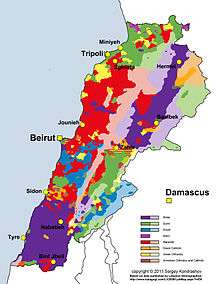
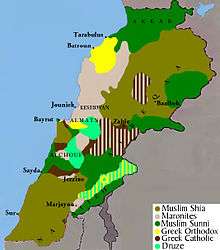
Lebanese Muslims
Lebanese Muslims are divided into many sects like Sunnis, Shias, Druze, Alawites, and Ismailis.
Lebanese Sunnis are mainly residents of the major cities: west Beirut, Tripoli, and Sidon. Sunnis are also present in rural areas including Akkar, Ikleem al Kharoub, and the western Beqaa Valley.
Lebanese Shias are concentrated in Southern Lebanon, Baalbek District, Hermel District and the south Beirut (southern parts of Greater Beirut).
Lebanese Druze are concentrated south of Mount Lebanon, in the Hasbaya District and Chouf District. Under the Lebanese political division (Parliament of Lebanon Seat Allocation) the Druze community is designated as one of the five Lebanese Muslim communities (Sunni, Shia, Druze, Alawi, and Ismaili), despite the Druze and Muslims having very different beliefs.
Lebanese Druze
The Lebanese government tend to count its Druze citizens as part of its Muslim population.
Lebanese Christians
Lebanese Christians are divided into many groups, several types of Catholics for instance the Maronites and Greek Catholics (Melkites), Greek Orthodox, Oriental Orthodox (among which are Syriacs, Armenians and Copts), Church of the East (Assyrians) and Protestants.
Lebanese Maronites are concentrated in the north Beirut (northern parts of Greater Beirut), northern part of Mount Lebanon Governorate, southern part of North Governorate, parts of Beqaa Governorate and South Governorate.[12]
Greek Catholics are found everywhere but in particular in districts on the eastern slopes of the Lebanese mountain range and in Zahle where they are a majority.
Lebanese Orthodox are concentrated in the north Beirut (northern parts of Greater Beirut), Lebanese North areas including Zgharta, Bsharre, Koura, and Batroun.
Lebanese Protestants are concentrated mainly within the area of Beirut and Greater Beirut.
The other Lebanese Christians are concentrated also in similar areas like in east Beirut (northern parts of Greater Beirut), Mount Lebanon, Zahlé, and Jezzine.
Lebanese Jews
As of 2018, the Jews in Lebanon make up the smallest religious group, with merely 0.08% of the population.
Current political and religious issues
Under the terms of an agreement known as the National Pact between the various political and religious leaders of Lebanon, the president of the country must be a Maronite, the Prime Minister must be a Sunni, and the Speaker of Parliament must be a Shia.
Although Lebanon is a non-secular country, andfamily matters such as marriage, divorce and inheritance are still handled by the religious authorities representing a person's faith. Calls for civil marriage are unanimously rejected by the religious authorities but civil marriages conducted in another country are recognized by Lebanese civil authorities.
Non-religion is not recognized by the state. The Minister of the Interior Ziad Baroud made it possible in 2009 to have the religious sect removed from the Lebanese identity card. This does not, however, deny the religious authorities complete control over civil family issues inside the country.[13][14]
Gallery
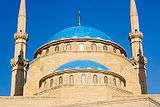 Detail of the dome of the Khatem al-Anbiyaa Mosque in downtown Beirut
Detail of the dome of the Khatem al-Anbiyaa Mosque in downtown Beirut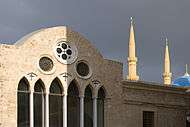 Saint George Eastern Orthodox Cathedral in downtown Beirut
Saint George Eastern Orthodox Cathedral in downtown Beirut- Saint George Greek Orthodox Cathedral on Nejme Square
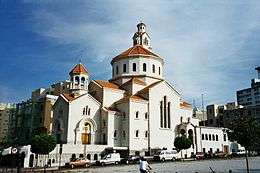 St. Elie and St. Gregory the Illuminator Armenian Catholic Cathedral in Beirut
St. Elie and St. Gregory the Illuminator Armenian Catholic Cathedral in Beirut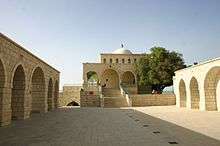 Druze Prophet of Job Shrine
Druze Prophet of Job Shrine%2C_based_on_2017_data.png) Listing the largest community in the Lebanese electorate, per qada and/or "minor district".
Listing the largest community in the Lebanese electorate, per qada and/or "minor district".
Green = Sunni
Purple = Shia
Blue = Druze
Yellow = Maronite
Orange = Greek Orthodox
Red = Armenian Orthodox
See also
References
- دراسة نقدية في قانون الانتخاب النسبي. Lebanon Files
- "Middle East :: Lebanon — The World Factbook". Central Intelligence Agency, United States. Retrieved 9 May 2020.
- "International Religious Freedom Report for 2017". www.state.gov. United States Department of State. Retrieved 30 March 2019. Cites Statistics Lebanon for most Lebanon statistics
- Alfred B. Prados (June 8, 2006). "CRS Issue Brief for Congress: Lebanon". The Library of Congress. Retrieved June 11, 2012.
- "Bassil promises to ease citizenship for expatriates". dailystar.com.lb. 1 May 2014. Retrieved 17 April 2018.
- Writer, Joseph A. Kechichian, Senior (17 November 2015). "Lebanon contemplates a new citizenship law". gulfnews.com. Retrieved 17 April 2018.
- "Population (Lebanon)". Country Studies. Federal Research Division of the Library of Congress. Retrieved 30 December 2019.
- "International Religious Freedom Report for 2012: Lebanon". United States Department of State. Retrieved 30 March 2019.
- "Elections in Lebanon" (PDF). International Foundation for Electoral Systems. 2011. Retrieved 9 July 2017.
- "Seif And The "Fire Worshipers" Of Beirut?". Seif and his Beiruti Adventures. 9 October 2010.
- Chebaro, Mohamed (18 November 2014). "Lebanon's Zoroastrians want a civil state". NOw (mmedia.me). Archived from the original on 3 May 2016.
- Lebanon Maronites Overview World Directory of Minorities. June 2008. Retrieved 28 December 2013.
- "Religious affiliation to disappear from Lebanese documents". www.asianews.it. 13 February 2009. Retrieved 30 March 2019.
- Religious Affiliation Can Be Removed From Lebanese ID Cards. Barcode Nation (2009-02-25). Retrieved on 2013-09-26.